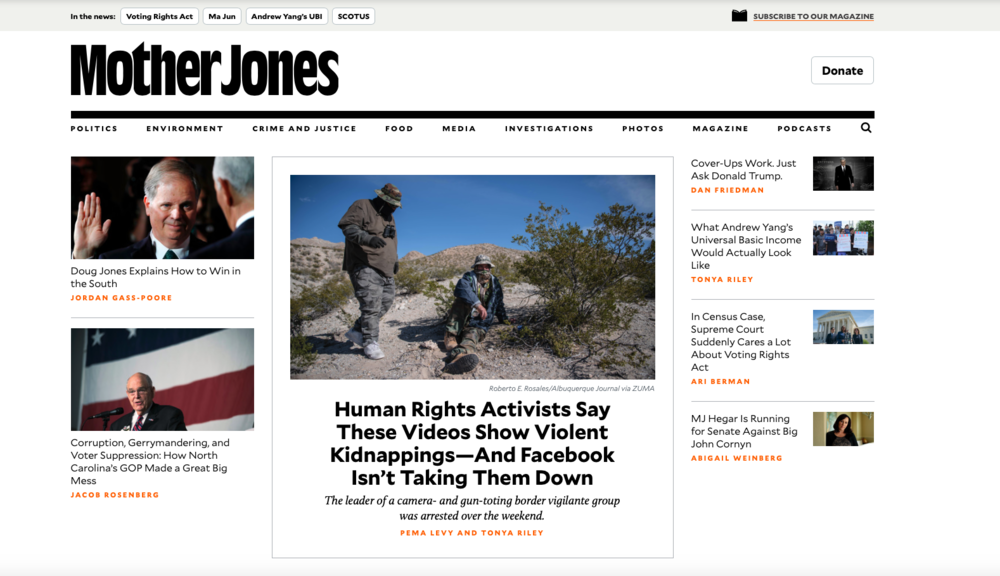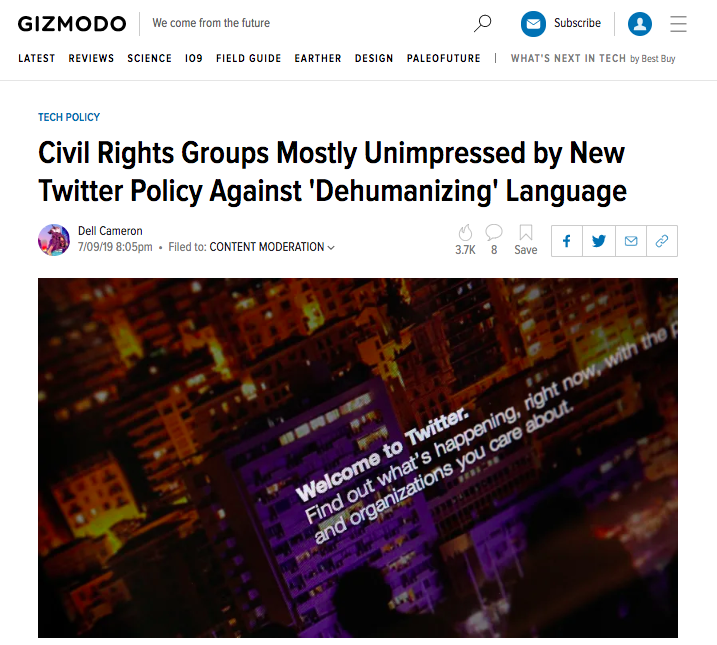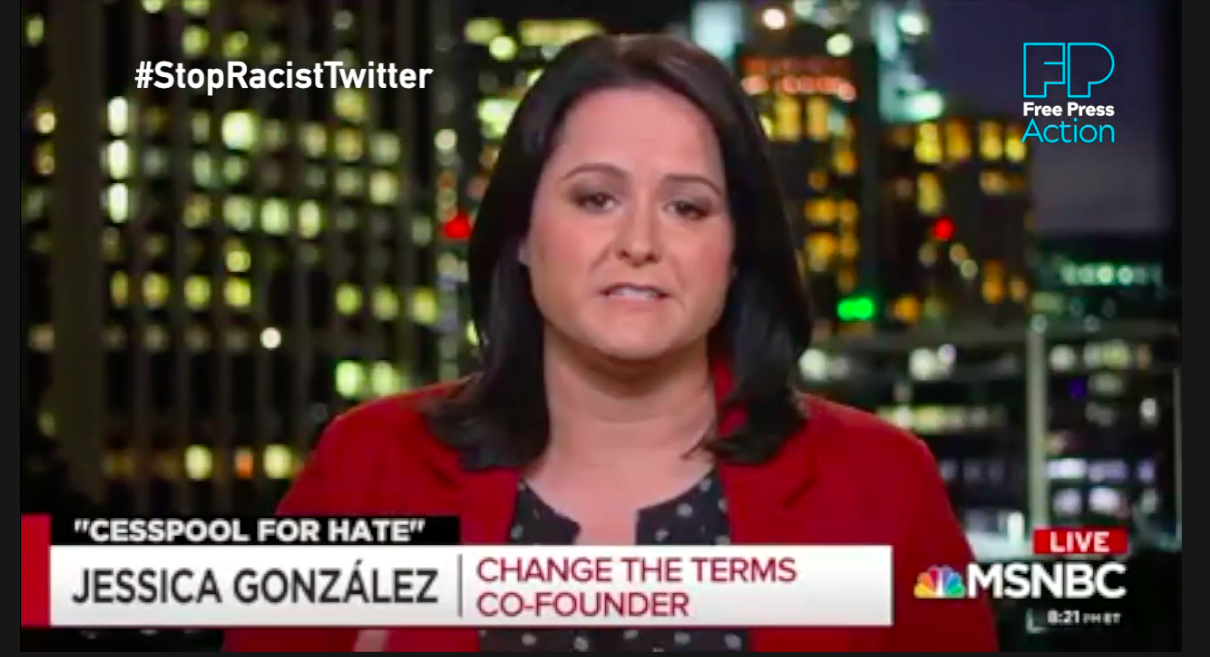Change the Terms Coalition: Changing the conversation on hate online
In April 2019, Change the Terms, a coalition of more than 55 civil, human and digital rights organizations, engaged Balestra Media for assistance developing a long-term communications strategy and providing earned media support and digital media services to pressure technology companies to reduce hateful activity on their platforms.
Balestra Media quickly designed a plan for proactive communications, provided rapid response assistance on breaking news, and launched the coalition’s Twitter and Medium accounts. These efforts helped insert Change the Terms into the conversation on technology and civil rights, and gained partners recognition among journalists and influencers as key experts, leading advocates and stakeholders representing directly-impacted communities.
During our first eight months together, Change the Terms has quickly become the go-to resource for the media on reducing hate online. Balestra Media has helped Change the Terms drive high-profile media coverage and Twitter conversations around Big Tech’s action and inaction to become the primary source for information and personal stories to hold tech companies accountable to diverse communities for eliminating hateful activity online.
When a Facebook Live video showing a vigilante border group holding immigrants hostage at gunpoint appeared in April 2019, Balestra Media executed a communications plan that took this egregious example of weak enforcement to make the larger point that platforms must adopt Change the Terms’ model policies. Balestra Media developed a powerful Twitter thread from Change the Terms that illustrated how the videos dangerously popularized the prohibited activities of the border militia, earning 67,000 impressions and 1,500 engagements in the first week the coalition’s Twitter account was live.
Balestra Media placed a front-page story on Mother Jones, which embedded Change the Terms’ tweet thread and credited the coalition for helping flag the content for removal. Before our outreach, coverage of the militia was focused on their actions, rather than on the ways that Facebook was allowing them to promote, recruit and fundraise on their platform. After the media interest activated by Change the Terms, Facebook was pressured to respond on-the-record about the militia’s ongoing violations of their Community Standards.
When Facebook announced the results of their internal civil rights audit, we coordinated with leaders at our partner organizations on a communications plan to align on messaging and tactics.
While acknowledging that some important steps were taken by Facebook, Change the Terms maintained that they were not significant strides. Using a strongly-worded rapid response statement, Balestra secured more than a dozen coalition media hits highlighting the need for a civil rights framework to guide meaningful changes to reduce hate on Facebook in mainstream TV outlets including CNN, NBC, and Fox News; major tech outlets like Axios, Gizmodo, and CNET; and important outlets read by policymakers such as The Hill and ThinkProgress. Our team helped drive a media narrative that characterized the update as insufficient and overdue.
When Twitter announced its narrow policy banning only dehumanizing language directed at religious groups, our coalition pushed the company to expand its policy to be more inclusive of all marginalized groups and better enforce it. By highlighting the ways Twitter has continued to fail to protect groups frequently targeted by hate, we advocated for the communities directly impacted by the harassment and normalization of bigotry that Twitter enables through its lackluster policies and practices. Change the Terms’ unified message, underscoring how far Twitter has to go to protect its users, permeated media coverage. Outlets quoted coalition spokespeople and partner organizations across tech publications like Wired and Gizmodo, and mainstream outlets including Fox News, BuzzFeed and Yahoo News.
In August 2019, Balestra Media helped Change the Terms organize a press call ahead of the second anniversary of the deadly Unite the Right Rally in Charlottesville with local civil rights leaders following the fatal mass shootings in El Paso and Gilroy. Change the Terms drew a direct connection between online hate and real-world violence by bringing the stories and voices of people directly impacted by hate and violence plotted on Twitter to the forefront of the conversation. Immediately following the distribution of the press call advisory, Twitter contacted Change the Terms campaigners to set up an in-person meeting. Balestra Media secured a primetime media hit on MSNBC’s All In with Chris Hayes, and coordinated coverage from outlets nationally (NPR, Politico, USA Today) and locally (CBS-19, ABC-16, NPR affiliate WVTF). The Change the Terms message permeated TV, radio and print, explaining how Twitter’s current policies are not nearly good enough and lives are still at stake.
Change the Terms continued this advocacy for the next two months, holding meetings with platform leaders and urging executives to enact impactful changes to curb hate on the platform. After our call to action went unheeded, Change the Terms members organized a direct action to bring more than a dozen people and 110,000 petition signatures to Twitter’s headquarters in San Francisco. Through this protest and petition delivery, Change the Terms refocused press and public attention on Twitter’s inaction and the ongoing threat of white supremacists that remain on the platform, despite years of grassroots pressure.
Balestra alerted media to the upcoming protest, supplied reporters with advance copies of a report on Twitter’s lackluster progress combating online hate, worked with partner organizations on a hard-hitting press release, and provided social media guidance and sample posts to all coalition signatories. The action was previewed in Politico’s Morning Tech, described in CNET, and covered in a substantial and nationally-syndicated piece from The Mercury News. Balestra Media also secured a comprehensive TV segment on FOX-2, reaching hundreds of thousands of local viewers, which included footage of the protest—signs with vile quotes from white supremacists on Twitter and stacks of petitions in support of the campaign—and an interview with coalition co-founder Jessica J. González.
Just three weeks after Facebook’s announcement, Twitter announced it would ban all political ads from the platform. While most media outlets painted Twitter’s ad ban as a net positive, Change the Terms put the spotlight on the platform’s inaction on unpaid posts that stoked hateful activity.
Balestra Media issued a rapid response statement from Change the Terms that outlined why Twitter’s ad ban was not a comprehensive solution to fight online hate, and broadened the perception in the media that only paid posts matter. By acting quickly to issue statements on both Twitter’s initial policy announcement and later announcement of full policy details, Balestra Media secured stories in more than seven national outlets. Free Press’ Jessica J. González's statements that paid ads are just a small piece of the insidious issue of online hate, and that banning political ads alone is not nearly enough to make Twitter a place for healthy conversations, ran in tech outlets (CNET, Gizmodo) and national publications (The Guardian, The Washington Post, the Daily Mail).
In October 2019, Facebook and Twitter launched a public relations blitz to announce and defend their paid political ad policies. While media coverage initially focused on the implications of these policy changes on political campaigns and the 2020 election, Change the Terms was the only coalition stressing the dangers of unpaid content and the harmful consequences of platforms’ rules exemptions for politicians.
When Facebook announced it would exempt politicians from the company terms of service and allow politicians to post lies in ads without fact-checking from the platform, Balestra quickly drafted tweets from Change the Terms calling out Facebook’s hypocrisy in labeling false posts from everyday users with a warning while still allowing politicians to lie with impunity. By seizing the moment and responding rapidly to breaking news, Balestra Media landed Change the Terms in The Washington Post twice in one week, including a letter to the editor and interviews with two influential reporters.






